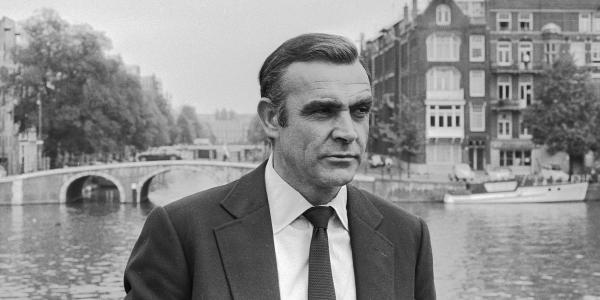Colin Burnett encourages a re-examination of the famous but misunderstood spy.
In a summer movie season stacked with sequels — more aliens, more superheroes, more tornados — it’s a good time to get acquainted (or reacquainted) with the serial hero who set the standard. He’s a super-spy who forever changed the way movies are made. His name is Bond. James Bond.

The Bond movie franchise may not always reach great heights of cinematic artistry, but the films have plenty to offer casual moviegoers as well as film critics and scholars, said Colin Burnett, associate professor of film and media studies.
Burnett is currently writing a book exploring the historical significance and narrative approach of the 007 novels, comics, and movies. His new article in The Journal of Narrative Theory offers a sneak peek of that work and pushes back on common criticisms and misconceptions of the franchise.
Burnett spoke with the Ampersand about Bond and the storytelling behind the spy.
What do audiences get wrong about Bond?
The storytelling is more sophisticated and, I would argue, more groundbreaking than people realize. Some scholars and critics dismiss the Bond movies as a series of one-off movies that don’t form a cohesive narrative. But if we look more closely, we can spot the connective tissue that binds the movies together. Admittedly, the connections are subtle in the pre-Daniel Craig era from “Dr. No” (1962) to “Die Another Day” (2002), but they exist. It’s an impressive feat of creativity that’s largely gone unnoticed.
Consider “On Her Majesty’s Secret Service” (1969), one of my all-time favorite Bond movies. It’s the only installment featuring George Lazenby as Bond, and not everyone likes his style. He’s more smug than cool. But that movie firmly established Bond as a serial character. In an early scene, Bond clears out his desk after (temporarily) resigning from the Secret Service. Attentive viewers will notice a dagger from “Dr. No” and a garrote wristwatch previously seen in “From Russia with Love” (1963). Earlier, Bond’s boss M reprimands him for fruitlessly pursuing Ernst Blofeld, a villain introduced in “From Russia With Love.”

Do you recommend watching the Bond movies in order?
Each installment has its own plot and its own rewards, so it’s OK to skip around. That’s part of the genius of the series. In “For Your Eyes Only” (1981), you can see Bond thwarting the KGB’s attempts to acquire a device that can track Royal Navy submarines. Jump forward to “Die Another Day” and you’ll be treated to a North Korean plot to attack South Korea with a diamond-powered satellite. Go back to “Live and Let Die” (1973) and you’ll see Bond infiltrating a massive drug ring. Taken this way, the films appear to stand alone.
But you’ll get something extra if you watch them in order. Pay close attention, and you’ll pick up on narratives and themes that slowly build throughout the franchise.
The series is quite strategic. It’s welcoming to new viewers who are only looking for a night’s entertainment, and it’s also rewarding for committed viewers who remember subtle details from earlier entries.
In your opinion, are all the Bond movies actually good?
Some movies are harder to watch than others. “A View to a Kill” (1985) is god-awful in some ways. The plot moves at a snail’s pace and Roger Moore was long in the tooth by that point. The Roger Moore movies in general eventually devolved into a series of slapstick gags. But even “A View to a Kill” has its redeeming qualities. It builds on the larger story, including the evolving relationship between KGB head General Gogol and M.
Your latest article debunks the “code name” theory. Can you explain what that is and why you think it’s wrong?
Some rabid Bond fans have a theory that the seven actors who have played James Bond in films were never meant to represent the same person. In their view, each new Bond is a different spy who happened to inherit the James Bond 007 code name.
I expect to get some grief from Bond fans, but I see no evidence to support the code name theory. The movies contain subtle signs that each Bond is meant to be the same person, even though Roger Moore doesn’t look much like Sean Connery and neither looks much like Daniel Craig. As an aside, I was excited by the prospect of Idris Elba playing the part, but I’m afraid that opportunity has passed.
Did the Bond movies help pave the way for the franchises we see today, such as the Marvel Cinematic Universe and Star Wars?
I often tell my students that the Marvel Cinematic Universe is one of the most ambitious movie experiments of all time. It’s crass commercialism, sure, but building a narrative that connects all those feature-length films is an incredible achievement.
The MCU and Star Wars franchises are in a class of their own, and Bond movies can occasionally look quaint and old-fashioned by comparison. But Bond showed the possibilities of a serial drama way back in 1962. Bond movies laid the foundation for what we now call blockbuster cinema. We should give Bond the credit he deserves.
Header image: Sean Connery in Amsterdam while shooting "Diamonds are Forever." National Archives





